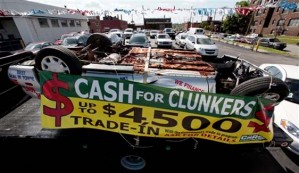
A new report by a government watchdog agency found children, dead people and prisoners collected checks illegally under the Cash for Clunkers program.
In some parts of the country, it’s been claimed, the dead still vote. True or not, it appears at least some folks who were clearly not around to buy a car nonetheless had claims filed on their behalf for tax credits on the oft-maligned Cash for Clunkers program used to spur U.S. car sales in 2009.
The government-run watchdog, the Treasury Inspector General for Tax Administration, also found 439 prisoners put in claims, “even though they were in prison for a full year in 2009 when the vehicle was purportedly purchased,” the agency reported. And it found that a number of children under driving age also submitted claims for tax credits that ranged as high as $4,500 a vehicle.
The report found that the Internal Revenue Service failed to flag 4,257 questionable claims, in all, which generated $151.1 million in tax refunds. That was a relatively small figure when compared with the overall size of the so-called Cash for Clunkers campaign, which Congress approved as a way to pull the U.S. auto industry out of its worst downturn since the Great Depression.
“While no amount of fraud is acceptable, more than 4.3 million taxpayers claimed more than $7.2 billion in qualified motor vehicle deductions and only a small percentage involved questionable claims,” the tax agency said.
The program, which expired in December 2009, required buyers to trade in an older vehicle for a Qualified Motor Vehicle, or QMV that met specific requirements, notably fuel economy. Initially conceived as a way to help spur demand for the fast-failing Detroit automakers the program was ultimately opened up to the entire industry. Indeed, Asian imports eventually recorded far more sales under the program than did Detroit’s Big Three.
But the program generated such strong initial sales that the program ran out of money within a matter of weeks, Congress responding by authorizing additional funds that still didn’t last until the end of 2009, as originally conceived.
While struggling car dealers clearly benefited, many complained about paperwork problems and the challenge of getting the government to cut checks, which many buyers used as downpayments. In the end, the program was seen as a cautious success, boosting demand but resulting in a variety of problems that led lawmakers to reject requests to extend the Clunkers plan.

It’s a shame that we’re always going to have that small group of people that are going to try a game the system but what is a greater shame is the fact that this program was at first was suppose to be just for the big three hear in America but some Republicans governors said Oh, no, we got to have it for all car makers so here ore tax dollars were also going over seas to help a foreign country. Not long after our cash for clunkers Japan had their own cash for clunkers program and you know what? They had it just for the Japanese car Companies and not any foreign Companies that are selling in Japan. And why did they do that, because they’re not that stupid.